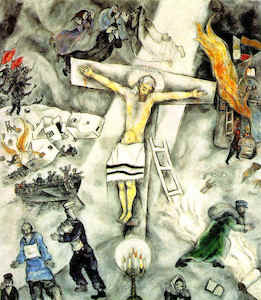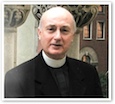The poor paint!
- FATHER GEORGE W. RUTLER
The wife of a most distinguished oil painter, who taught at the Art Students League for many decades, having started there as a boy with a scholarship given by Mayor LaGuardia, told me that he had "perfect pitch" when it came to mixing his palette.
 She also confided that he never painted autumnal scenes of leaves at full peak because the colors are so brilliant that on canvas they would seem artificial. In my brief tutelage under him, I found his happiness in his work contagious. But the most important thing I learned was that lesson about the natural outdoing artifice. And this can be taken a step further with reference to God's grace which, as Aquinas said, does not destroy nature but perfects it, despite our limitations.
She also confided that he never painted autumnal scenes of leaves at full peak because the colors are so brilliant that on canvas they would seem artificial. In my brief tutelage under him, I found his happiness in his work contagious. But the most important thing I learned was that lesson about the natural outdoing artifice. And this can be taken a step further with reference to God's grace which, as Aquinas said, does not destroy nature but perfects it, despite our limitations.
In other words, if the best human talent cannot replicate the highest beauties of nature, we cannot expect to be more than heroic on our own. Saints are not superhuman. Sanctity is simply the state of the virtues lived to an intensity beyond unaided human effort. This gift is available to all who allow God to infuse their lives with the love that made them. "I no longer live, but the Messiah lives in me, and the life that I am now living in this body I live by the faithfulness of the Son of God, who loved me and gave himself for me" (Galatians 2:20). Paul of Tarsus was not less who he was, but more than he had been, when that change happened. It is rather like Yehudi Menuhin's violin; for when a lady said that his violin "made such a beautiful sound" he placed his ear to it and said that he heard nothing. Divine grace is to the human being what human talent is to the instrument of wood and strings.
This explains why saints experience such transporting joy commingled with suffering: Living a life of grace makes the gracelessness of a fallen world more painful for them than it does for others who have passively adjusted to it. To continue the theme of aesthetics, I am reminded of how William F. Buckley, who could do many but not all things well, showed Chagall a picture he had painted, only to hear that master groan, "The poor paint!"
Perhaps that gives a sense of the divine wrath caused by God's contemplation of lives that have neglected to let him be in them. Think of what Attila the Hun or Mao Tse-tung might have accomplished had they accepted the Gospel. Conversely, one dreads to think what evil Aquinas might have caused if he had used his brilliance to tell lies, or what desolation Teresa of Calcutta might have spread by twisting her fame to propagate eugenics.
The Feast of All Saints celebrates those who show us what we may or may not become by showing what we can be.
 This is Meaghen Gonzalez, Editor of CERC. I hope you appreciated this piece. We curate these articles especially for believers like you.
This is Meaghen Gonzalez, Editor of CERC. I hope you appreciated this piece. We curate these articles especially for believers like you.
Please show your appreciation by making a $3 donation. CERC is entirely reader supported.

Acknowledgement
 Father George W. Rutler. "The poor paint!" From the Pastor (October 31, 2020).
Father George W. Rutler. "The poor paint!" From the Pastor (October 31, 2020).
Reprinted with permission of Father George W. Rutler.
The Author
 Father George W. Rutler is the pastor of St. Michael's church in New York City. He has written many books, including: The Wit and Wisdom of Father George Rutler, The Stories of Hymns, Hints of Heaven: The Parables of Christ and What They Mean for You, Principalities and Powers: Spiritual Combat 1942-1943, Cloud of Witnesses — Dead People I Knew When They Were Alive, Coincidentally: Unserious Reflections on Trivial Connections, A Crisis of Saints: Essays on People and Principles, Brightest and Best, and Adam Danced: The Cross and the Seven Deadly Sins.
Father George W. Rutler is the pastor of St. Michael's church in New York City. He has written many books, including: The Wit and Wisdom of Father George Rutler, The Stories of Hymns, Hints of Heaven: The Parables of Christ and What They Mean for You, Principalities and Powers: Spiritual Combat 1942-1943, Cloud of Witnesses — Dead People I Knew When They Were Alive, Coincidentally: Unserious Reflections on Trivial Connections, A Crisis of Saints: Essays on People and Principles, Brightest and Best, and Adam Danced: The Cross and the Seven Deadly Sins.




